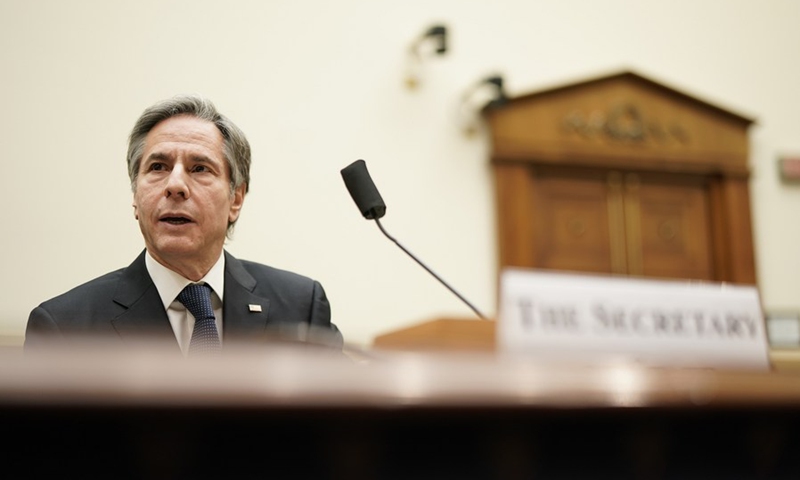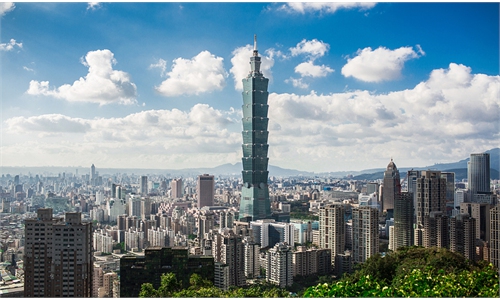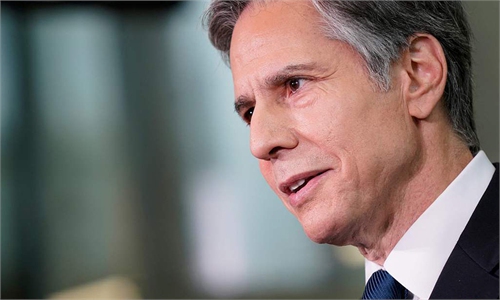
U.S. Secretary of State Antony Blinken Photo: Xinhua
The US is burying the possibility of easing China-US tensions and even escalating tensions due to US Secretary of State Antony Blinken's remarks on support for the island of Taiwan's involvement in the UN. Although the US attempt will fail eventually, China still needs to take tougher action, especially military ones, to further warn the US about how dangerous it could be if it continues to challenge China's bottom-line on the Taiwan question, experts said.
It seems like the force which wants to confront China and doesn't want to see any recovery in China-US ties has already dominated the US strategic and decision-making circle, and the force who prefers to handle China-US relations pragmatically is losing influence, said Chinese analysts.
Given the situation, the US would not get the cooperation it wants from China and will feel more pain in the areas that it believes it should compete with China, because Washington has already shown its intention to not only challenge UN Resolution 2758, but also the political foundation of China-US relations.
Blinken on Tuesday called on UN member states to support the island's "robust" participation in the UN system, according to the US State Department website.
Chinese Foreign Ministry spokesperson Zhao Lijian and the Chinese Embassy to the US have expressed strong dissatisfaction and lodged solemn representations in a statement on Wednesday, saying that the one-China principle is a widely recognized consensus among the international community and the bottom line of China's diplomatic relations with other countries, which does not allow the US' challenge and distortion.
Zhao said at a routine press conference on Wednesday that if the US insists on playing "the Taiwan card" this way, it will definitely risk China-US relations, and will seriously harm the peace and stability of the Taiwan Straits, and the interests of the US.
The Chinese Embassy in the US released a statement on Wednesday saying that the Taiwan question is not about so-called "values." By hyping them up, the US is just intentionally distorting this issue and misleading public opinion.
The Taiwan authority has been keeping its diehard position of "Taiwan secession" and adamantly refusing to recognize the "1992 Consensus". With the support and encouragement of its American boss, it is sparing no effort to expand its "international space" and go further down the path of "Taiwan secession," the embassy's statement said.
This is the biggest and real threat to peace and stability across the Taiwan Straits, and the fundamental reason why Taiwan has not been able to participate in the activities of multilateral organizations, including the International Civil Aviation Organization (ICAO) and the World Health Organization (WHO), it read.
Jin Canrong, an associate dean of the School of International Studies at the Renmin University of China, told the Global Times on Wednesday that the US is getting nervous about the latest development in the Taiwan Straits as it has seen the strong determination and strength of the Chinese mainland to solve the Taiwan question, and it might not be able to keep the Taiwan card in its hands anymore.
"So it wants to internationalize the Taiwan question, to transfer the matter from China's internal affairs to an 'international issue,' so that it could create more trouble to the process of the reunification of China," Jin said.
Yuan Zheng, deputy director of the Institute of American Studies at the Chinese Academy of Social Sciences, told the Global Times on Wednesday that Blinken's remarks will not just be "talking the talk," the US will take action, such as launching diplomatic offensives in the UN and relevant international organizations, to further provoke China on the Taiwan question.
The Chinese Embassy in the US said in a statement on Wednesday that "Fifty years ago, the US attempt to create 'one China, one Taiwan' or 'two Chinas' in the UN ended up a complete failure. But today, it is still emboldening and supporting 'Taiwan independence' forces and challenging international law and the basic norms governing international relations, including the one-China principle. Such efforts will be futile and doomed to fail."
China has the ability and influence in the UN and other relevant international organizations to crack down on US attempts to support the Taiwan secessionist authority to gain "international space," and the international community has broad consensus on the "one-China principle," said experts.
Only a few US allies, such as the AUKUS and Quad members, and some Eastern European countries like Lithuania, would follow Washington to provoke China if Washington really wants to launch a diplomatic battle with Beijing in the UN, and the result would be another diplomatic failure for the US and its followers, Jin said.
In the past, the US even dared not to issue any proposal or draft resolution to support the Taiwan secessionist authority in international forums like the World Health Assembly, because the US knows that the result would be a huge humiliation to the US since most countries will stand for the "one-China principle." So "Blinken's remarks show that the top diplomat of the US is trying to bite off more than he can chew," said Lü Xiang, an expert on US studies and research fellow at the Chinese Academy of Social Sciences.
Although China is capable of cracking down on US diplomatic offensives, a diplomatic response is not enough, because the Taiwan question is about China's core interest and the political foundation of China-US ties, Yuan said, stressing that China would take tougher action, including military action, to warn the US of the seriousness of provoking China's redline.
Jin said that the People's Liberation Army is likely to take more direct action in the Taiwan Straits to respond to US provocations, and the US is the one that should be blamed for further damaging regional peace and stability.
Yuan said that "if the US keeps provoking, it means the PLA's previous warnings through military drills and air patrols have been ignored. Then the PLA will need to deter the US and Taiwan secessionists in other ways, such as sending military aircraft across the island or even conduct live-fire drills around the island."
In recent days, there were some signs that the two biggest economies of the world intended to ease their tensions in some fields, such as economy and trade. These signs included the most recent video conversation between Chinese Vice Premier Liu He and US Treasury Secretary Janet Yellen, and the release of Huawei's CFO Meng Wanzhou, who was illegally detained by Canada under US pressure.
However, Blinken's remarks are likely to bury the hope of the recovery of China-US ties and will even further escalate existing tensions, and the US won't be able to get China's cooperation in areas that it desperately needs help in, said experts.
Lü said it seems the US decision-making circle has now been divided into three parts - the force led by Blinken that wants to gain more power by making more trouble for China-US ties; the pragmatic force headed by professional economic officials like Yellen; and those who care more about the climate issue and need cooperation from China. "President Joe Biden is too weak to keep them all under control and sometimes even gets hijacked by the hardliners."
Jin said the possible recovery of China-US ties in some areas is perishing, and will get buried eventually if the US keeps provoking on the Taiwan question.
Yuan noted that as Blinken wants to cooperate, compete and confront with China when needed, "then we should let him know that there is no way the US could get cooperation from China if they cross China's redline on the Taiwan question, and the competition and confrontation will make the US feel more pain."




